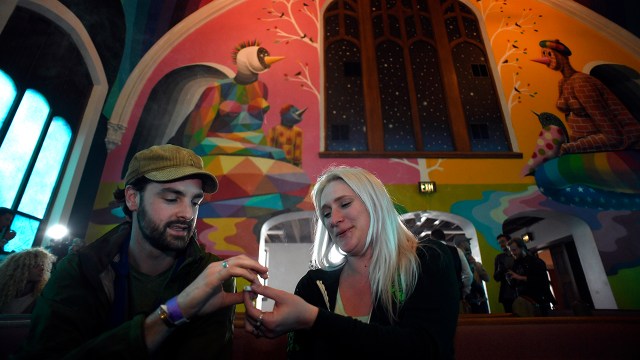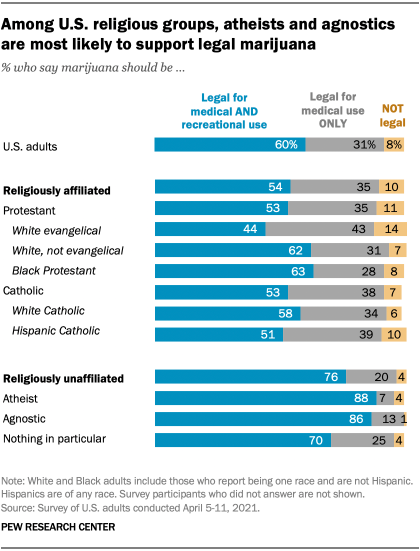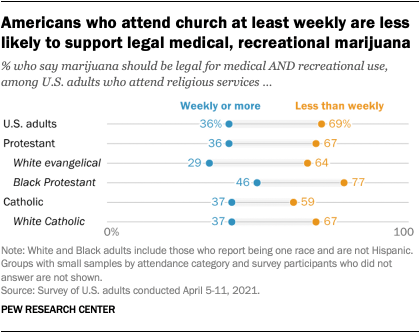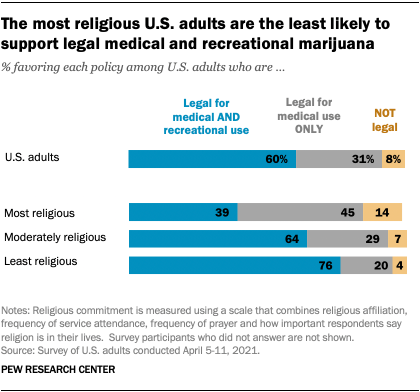
The vast majority of adults in the United States support allowing marijuana to some extent, according to a recent Pew Research Center survey. But opinions about whether and under what circumstances marijuana should be legal vary by Americans’ religious identity and their levels of religious commitment.
U.S. adults who are affiliated with a religion are less likely than religiously unaffiliated adults to support broadly legal marijuana. Among people who identify with any religious group, just over half (54%) believe marijuana should be legal for medical and recreational use, while roughly a third (35%) say it should only be legal for medical use. Among unaffiliated people – those who describe themselves religiously as atheist, agnostic or “nothing in particular” – about three-quarters (76%) say marijuana should be legal for both medical and recreational purposes, while just a fifth say legal marijuana should be restricted to medical use.
Among adults overall, 91% say marijuana should be legal in some form, including six-in-ten who say it should be legal for medical and recreational use and about three-in-ten (31%) who say it should be legal for medical use only.
Pew Research Center conducted this study to understand the public’s views about legalizing marijuana, and whether religion plays a role in people’s attitudes. For this study, we surveyed 5,109 U.S. adults in early April 2021. Everyone who took part is a member of the Center’s American Trends Panel (ATP), an online survey panel that is recruited through national, random sampling of residential addresses. This way nearly all U.S. adults have a chance of selection. The survey is weighted to be representative of the U.S. adult population by gender, race, ethnicity, partisan affiliation, education and other categories. Read more about the ATP’s methodology.
Here are the questions used for this report, along with responses, and its methodology.
Fewer than half of White evangelical Protestants favor broadly legal marijuana
White evangelical Protestants are the only group analyzed in this study in which fewer than half (44%) say marijuana should be allowed for both medical and recreational use. A similar share (43%) say marijuana should be legal only as a medical treatment, while 14% say marijuana should not be legal for either purpose.
White mainline Protestants and Black Protestants differ from their evangelical peers: Larger shares (62% and 63%, respectively) say marijuana should be legal for medical and recreational use, and smaller shares (31% and 28%) support legal marijuana only as a medical treatment.
Among Protestants and Catholics overall, views on marijuana are quite similar. Roughly half in each group say marijuana should be legal for medical and recreational use, while slightly more than a third say it should be legal only for medical use.
Of all the groups analyzed, atheists and agnostics are the most strongly in favor of broadly legal marijuana. Almost nine-in-ten atheists and agnostics (88% and 86% respectively – a statistical tie) favor legal marijuana for both medical and recreational use, while small minorities (7% and 13%, respectively) say marijuana should be legal only for medical use. Only 4% of atheists and 1% of agnostics say marijuana should not be legal.
Among people with no religious affiliation, those who say they are “nothing in particular” are not as united as atheists and agnostics on this question: 70% in this group say medical and recreational marijuana should be legal, and 25% support legal marijuana only for medical purposes.
Some religious groups differ from each other politically. For example, more than two-thirds of White evangelicals describe themselves as politically conservative or very conservative, compared with only 5% of atheists and 10% of agnostics. And White evangelicals are more likely to be Republicans or Republican-leaning independents, while atheists and agnostics tend to align with the Democratic Party. Ideology and party identification matter when it comes to views on marijuana, but they do not account for the religious differences described in this analysis.
Differences by religion in Americans’ views about marijuana also cannot be fully explained by the age or racial compositions of religious groups. That said, opinions do vary by age, especially among Protestants.
Among Americans overall, about two-thirds (67%) of those under the age of 50 support allowing legal marijuana for medical and recreational purposes, compared with just over half (53%) of people 50 and older. Among Protestants, 62% of those under 50 support legal marijuana for recreational and medical use, compared with 46% of those who are older. There is no age gap among Catholics and a modest one (78% and 72%) among religiously unaffiliated Americans.
Highly religious Americans are less likely to favor broadly legal marijuana
U.S. adults vary in their religious beliefs and practices. Pew Research Center regularly asks Americans how frequently they attend religious services, how often they pray and how important religion is in their lives. Of these measures, worship service attendance has the strongest connection to views about marijuana.
Frequent church attenders are less supportive of broad legalization than others, even within religious groups. For example, among White evangelicals who say they attend religious services at least weekly, 29% favor legal marijuana for both medical and recreational use, compared with 64% of White evangelicals who attend services less often.
Black Protestants also are starkly divided by church attendance: 47% of those who attend services weekly or more support broadly legal marijuana, compared with more than three-quarters (77%) who go less often.
Overall, just over a third of Protestants who normally go to religious services at least weekly (36%) and about two-thirds of those who attend less often (67%) support broadly legal marijuana. Only 37% of Catholics who attend weekly services believe that marijuana should be legal for recreational and medical use, compared with 59% who attend less often.
The connection between service attendance and views on marijuana legalization suggests that religious socialization could play a role in shaping attitudes about the legality of the drug – similar to how it affects Americans’ attitudes and behaviors surrounding alcohol and tobacco. Many religions emphasize temperance and warn against intoxication. Worship leaders often issue reminders of religious norms during services, and congregations might create social pressure to live up to them. Religious belief and practice also are thought to buffer against substance use by serving as a healthy coping mechanism and connecting adherents to a social support system.
Opinions about whether marijuana should be legal for recreational and/or medical use also differ based on how often people pray and how important they say religion is in their lives. Fewer than half of adults who pray every day (46%) say marijuana should be legal for both medical and recreational use, compared with roughly seven-in-ten (72%) of those who pray less often. Similarly, people who say religion is “very important” in their lives are less likely to favor broadly legal marijuana than those who say religion is less important (44% vs. 71%).
Combining measures of affiliation, service attendance, prayer frequency and the importance of religion in a scale of religious commitment illustrates the relationship between piety and opinions about marijuana among U.S. adults. (Most Americans on the high end of the scale affiliate with a particular religious group, attend services weekly or more often, pray every day and say religion is “very important” in their lives. Most on the low end have no religious affiliation, seldom or never attend services or pray, and say that religion is “not too” or “not at all important” in their lives.)
Among the most religious adults, 39% say that marijuana should be legal for both medical and recreational use, compared with about three-quarters (76%) of the least religious adults. Unlike Americans overall, the most highly religious adults are more likely to say that marijuana should be legal only for medical use than to say it should be legal for medical and recreational use. Nearly half (45%) of these highly religious adults believe marijuana should only be legal as medicine; only 20% of the least religious adults say the same.
As of early 2021, 17 states and the District of Columbia had legalized marijuana for adult recreational use. Roughly half of Americans who are in the least religious category (48%) live in a state where recreational marijuana is legal, and one-in-five (22%) live in states where it is not legal for any use. People who are highly religious are more evenly distributed across states. For example, among those who are most religious, 33% live in states where marijuana is broadly legal, 32% live in states where it is only legal for medical use and 35% live in states where it is not legal.
Note: Here are the questions used for this report, along with responses, and its methodology.



